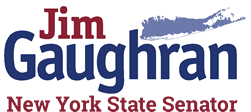Ann Darcy went to her Huntington Station church to get what was advertised as a free COVID-19 test. But she recently received a whopping $760 bill.
“I didn’t know what this was for,” she said. “I thought it was a mistake.”
Darcy said that, after she argued with representatives of the nonprofit that performed the test, Hudson River Healthcare, the bill was voided. But, she said, “What about all the people who don’t know this is not a legitimate expense and may pay it?”
Darcy is one of seven people who complained to the office of Sen. James Gaughran (D-Northport) about charges for the May tests at St. Hugh of Lincoln Catholic Church in Huntington Station, Gaughran said.
Suffolk County paid for the testing in Huntington Station and at other locations in the county considered “hot spots” because of high coronavirus infection rates at the time, county spokeswoman Marykate Guilfoyle said.
John Tomlin, a spokesman for HRH, which is based in Westchester County, said any bill for a COVID-19 test at St. Hugh and other pop-up sites was sent in error. “They should not have to pay for it,” he said.
COVID-19 tests are free for most people, under federal laws enacted in March. But there are some gaps that can lead to charges, said Karen Pollitz, a senior fellow at the Kaiser Family Foundation, a San Francisco-based nonprofit that analyzes health policy.
Insurance companies are, with few exceptions, supposed to pay for COVID-19 tests and COVID-19 antibody tests, but health care providers that don’t take insurance are legally allowed to charge, she said. Medicare and Medicaid also cover testing, she said.
Tomlin said anyone who receives a bill for a test at a Suffolk pop-up site should call HRH, and anyone who paid for the test will get a refund. Some who got COVID-19 tests inside one of HRH’s 10 permanent health centers in Suffolk may get bills with legitimate charges, he said.
In addition, Tomlin said, some uninsured people were mistakenly billed for post-test medical visits, such as to check on underlying health conditions, if their visits were covered by government grants, and are being sent letters rescinding the bills. In total, 1,615 Long Island patients were incorrectly billed, he said.
Gaughran, who wrote to HRH about the test charges, said he’s worried there are other cases he’s unaware of involving Long Islanders being mistakenly billed for coronavirus tests, by HRH or other health care providers.
“We have a public health pandemic right now and we want to encourage people to be tested,” he said. “Part of the encouraging is the public policy that there will be no cost. So [what] if all of the sudden you have some people starting to get billed, and the word spreads about that, when they were told it was free? It’s really going to discourage people from getting tested.”
Darcy said HRH initially resisted voiding the bill and only did so after she said she would report the charge to the state. Her bill shows charges for a “20 Min-Office Visit,” a “Telehealth Visit” and a “Visit New Patient” — even though she said all she got was a test and then results.
Test charges varied greatly. Diana Valenti, 86, of Huntington Station said she went with husband John Valenti, 88, to get tested — but his bill from HRH was $775 and hers was $275.
“It’s just unconscionable they would start charging,” said Diana Valenti, noting that many residents of Huntington Station are struggling economically.
Valenti, who is not among those who contacted Gaughran, said an HRH representative apologized and said “it was a mistake that I was billed” — but that HRH would file claims with Medicare and the couple’s supplementary insurance company.
Lisa Breland, 58, of Huntington said when she called HRH last week to complain about a $215 bill for the St. Hugh test, the agent would not back down on the charge.
“He said, ‘We’ll just keep sending you bills,’ ” she said.
Breland said she earlier had received a letter from BioReference, a New Jersey-based laboratory that analyzes COVID-19 tests for HRH, encouraging her to submit a claim for $100 for the test to her insurance company and stating that, if she’s uninsured, the company may be able to get federal funding for the test. BioReference is investigating why she and others were charged, company spokeswoman Hillary Titus said.
Elizabeth Wood, 59, of Huntington Station said she, her brother and two friends got bills from HRH ranging from $100 to about $750.
“It’s supposed to be free,” she said.
HRH didn't ask for insurance cards at the test site, those who were billed said.
Some insurance companies have told patients who got tested by New Hyde Park-based Northwell Health that they must pay part of the cost of tests, and Northwell has had to intervene to fight the charges, said Christopher Zavala, director of business development for Northwell’s laboratories.
The federal government covers testing for some — but not all — uninsured people. At HRH, uninsured people who get tested inside its health centers pay on a sliding scale, based on ability to pay, Tomlin said.
New York State testing sites, and sites funded by Nassau County, are free, as were hot-spot testing sites that Suffolk funded, spokespeople for those governments said.
